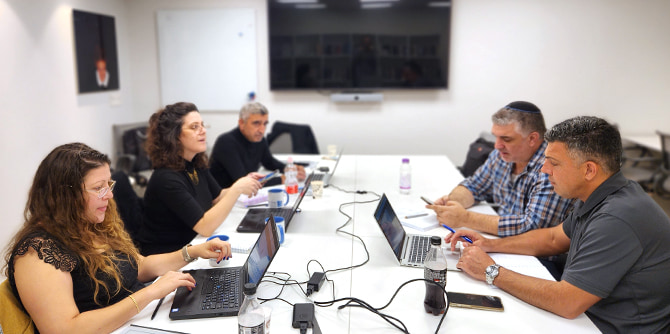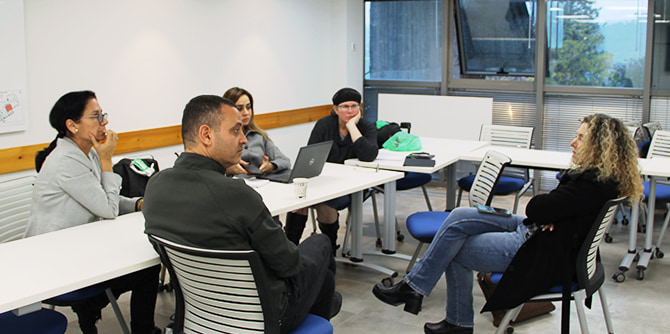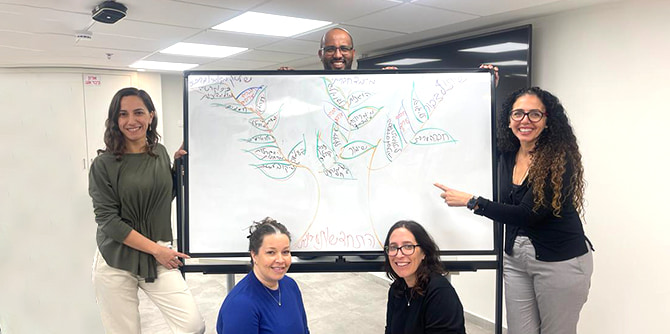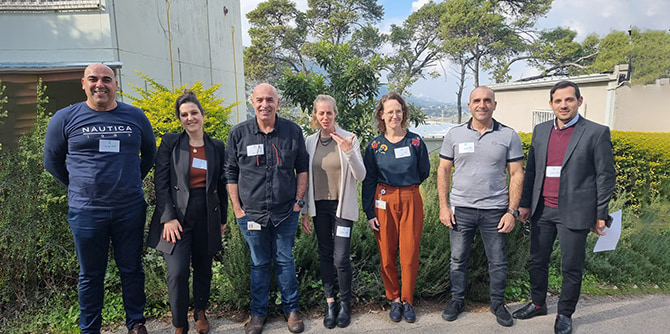 A meeting of the employment and economic development group (Photo: Dana Kleinman)
A meeting of the employment and economic development group (Photo: Dana Kleinman)
For the past two years, fellows of the Mandel Program for Regional Leadership in the North and the Mandel Program for Leadership for Public Service in the North have been participating in “The Northern Connection,” a study module designed to foster their regional identity and sense of belonging to Israel’s North. This learning module is led by the fellows themselves. They engage in active and independent study and manage the research process from beginning to end, thus finding and developing their own connections to the North through theoretical and practical research on concrete challenges and burning issues that face the region.
Connecting Fellows of the Regional Leadership and Public Service Programs
Originally, the Northern Connection module was taught separately, as part of the curriculum of each of two programs: the Mandel Program for Regional Leadership in the North and the Mandel Program for Leadership for Public Service in the North. This year, however, it was decided that the module be conducted in tandem for the fellows of the two programs. This decision was based on the understanding that while the fellows work in different fields, they operate in intersecting spheres of action and influence. Conducting the module jointly can thus enable fellows to gain a deeper and more comprehensive understanding of their respective areas of activity, strengthen their networking skills and ability to collaborate, and increase opportunities for collaboration between them in order to achieve a significant impact on the ground.
The Northern Connection module consists of four subjects that serve as the focus of studies: 1) general and higher education, 2) economic development and the labor market, 3) medicine and health, and 4) local government. The fellows of the two programs work in four small teams, each of which is tasked with investigating one of the above subjects and analyzing their findings with respect to at least three of the following five concerns: 1) the unique characteristics of the North, 2) the diverse society of the North, 3) the nature of local and regional leadership in the North, 4) an exploration of the given subject over time in the North, and 5) relevant public policy.
Much thought was devoted to the division of the fellows into teams, with care taken to ensure that each fellow’s area of research would not be in his or her field of employment. This was done to guarantee that fellows would gain different perspectives, be able to develop insights, and might be able to propose creative “outside the box” solutions. As part of their joint study, the fellows were also offered elective classes that could provide them with relevant support.
The fellows were first introduced to the module during the opening retreat of their respective programs. Later, in late November, a preparatory meeting was held for the fellows to get to know one another and receive preliminary background material for their area of study. During the next meeting, the teams defined the exact topic that they would investigate, laid out a work plan, and held online meetings with relevant people. Later in the year, the fellows will spend a day in the field, which will include interviews and meetings that will acquaint them with challenges and obstacles related to their chosen topic, while enriching their grasp of the topic and enabling them to outline relevant avenues for change and to propose practical steps for improvement.
At the end of the process, the teams of fellows from the two programs will present their work – including the guiding rationale, insights gained, and the action plan or policy tools they devised for addressing the various challenges they confronted – at a dedicated day-long event. Among other things, this event will afford the fellows the opportunity to receive feedback from their peers, the program faculty, and outside professionals and experts who will be invited to the event.
 A meeting of the health group (Photo: Rinat Pilipp)
A meeting of the health group (Photo: Rinat Pilipp)
Connecting Fellows of the Social Leadership Program
In the Mandel Program for Social Leadership in the North, “learning by doing” is the central axis along which we seek to bolster the fellows’ potential for influence. The “learning by doing” approach aims to refine and intensify the fellows’ sense of responsibility and mission, and empowers them to lead and work for the benefit of society in the North and beyond. The combination of knowledge acquisition and practical experience helps the fellows put their learning into practice, incorporate it into their workaday lives, expand their sphere of influence, become more familiar with the diverse society in the North, and deepen their ability to take action for the benefit of society. The fulcrum of this learning axis is in-depth study of the North and its challenges.
The field exercise is spread evenly over the year. Often, it is conducted in small “task teams” that intentionally comprise fellows who are diverse professionally, ethnically, and culturally. The teams study designated issues in the North from various perspectives, with the aim of coming up with adequate ways to respond to the challenges and capitalize on the opportunities at hand.
Following participation in a series of preliminary tours titled “A Journey of Exploration of the North,” the fellows set out to work in teams targeting four areas of central relevance to the life and wellbeing of the diverse members of society of the North: 1) public health, 2) general and higher education, 3) urban planning and housing, and 4) economic development and the labor market.
 Social Leadership fellows present the products of the first segment of their field exercise (Photo: Dana Kleinman)
Social Leadership fellows present the products of the first segment of their field exercise (Photo: Dana Kleinman)
In the first week of December, the fellows completed their first segment of study, “Barefoot Learning.” This segment focused on mapping and investigating their designated field by gathering knowledge, raising questions, and analyzing relevant data. Subsequently, a “peak day” was held, during which the fellows presented the results of their work and received feedback from a panel of experts in the various areas of study.
During the last week of January, the fellows will begin the second segment of the field exercise, titled "Local Stories." During this segment, the fellows will characterize and define their chosen topic as it pertains to a specific community or circumscribed location in the North. They will present their findings in mid-February.
The group field exercise will be followed by an
individual exercise, in which the fellows are urged to focus on a social issue that is of profound interest to them and which they would like to study in depth. The fellows devise their own course of study, including conceptualization, theoretical issues, and relevant academic literature, clarification of positions, analysis of case studies, meetings with key figures, and surveys of relevant organizations. At the end of this process, the fellows will present their research, the areas that they have identified as targets for viable intervention and impact, and their plans for promoting the latter following their graduation from the program.
The axis of “learning by doing” includes support from mentors who are experts in the fields and areas of study selected by the fellows, as well as input from a team of experts who provide specific feedback and advice as needed.
 Fellows from the Center’s three programs at a joint study day (Photo: Rinat Pilipp)
Fellows from the Center’s three programs at a joint study day (Photo: Rinat Pilipp)